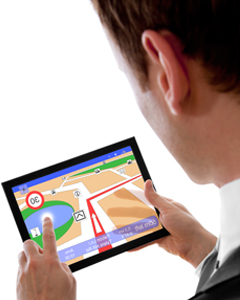- Category: May 2011
 Many people look at technical changes askance or often they even reject it from the beginning.
Many people look at technical changes askance or often they even reject it from the beginning.
So, it is no surprise that it took location-based services a bit time before it was adopted by the mainstream as an enhancement of the mobile channel for marketing measures.
The continuing hype around mobile can easily mislead us to neglect the basics with regards to content. Only those who understand the advantages and innovative nature of this medium can use mobile marketing in an all-encompassing way, as Tomi T. Ahonen, the popular author, consultant, and motivational speaker who recently attended the MMA Forum in Singapore, always emphasizes. He notes that most experts focus exclusively on the aspects of the mobile device as being the most personal medium in the world.
Unfortunately, their approach often falls too short by mistaking the "most personal medium" with "personally-tailored advertising channels", although the importance of an "opt in" is always pointed out.
Ahonen opens up other perspectives by explaining how mobile changed the world by giving us his seven aspects that make the medium and hence mobile marketing unique:
- Mobile is generally regarded as the first personal mass media;
- It is the only medium that is always carried around;
- It is always on;
- No other medium has a built-in payment function;
- Only mobile phones are always available at the “point of creative inspiration”;
- No other medium can determine as accurately any given target group;
- Only mobile devices can also measure the social context of media consumption.
These seven points provide mobile devices an additional qualitative dimension that did not exist in this form before. When taking a closer look at the truly unique features of the medium it becomes pretty fast, and pretty clear that location-based services (LBS) will become more and more relevant for advertisers and retailers as they are now commonly used and provide the opportunity to target specific users of the mobile Web at the point of sale.
Groupon already goes a step further and sells location-based deals in real time. Starting in the US, Groupon’s new service offers its users the chance to redeem coupons acquired immediately and not just the next day. They note that this is the next logical step in expanding their offerings on mobile phones by providing immediate location-based services including mobile couponing.
Merchants and restaurants can steer the way their mobile campaigns are targeted by offering promotions, for instance, only outside peak hours.
The recently published figures of the search engine giant Google are no less spectacular with sales in mobile advertising breaking the one billion dollar margin. In particular, the positive acceptance by the consumer, combined with the versatility and predictability of promotional success, will see couponing playing a major role in the mobile advertising market, which is a good reason to obtain a clearer picture of this ever changing environment and its concepts, actors and evolving technologies.
Coupons are used for short-term sales promotions in the retail and consumer goods industry and have established them as a concept in performance marketing. While mobile couponing has not revolutionized the classical concepts such as "buy-one-get-one-free", percentage discounts or free products, it has extended its applications with features such as location-based services, involvement in social media, interest-driven targeting, redemption in real time, and their continued availability on smartphones.
With the progressive spread of mobile devices, more and more providers will enter the market and offer different approaches in the implementation of mobile solutions.
By Daniela La Marca


